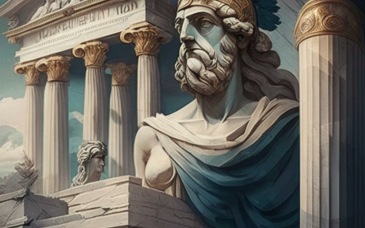In the pantheon of Greek mythology, the towering figure of Hercules stands as an enduring symbol of strength, valor, and the indomitable human spirit. This post embarks on a mythical odyssey, delving into the legendary tales that immortalize Hercules as Greece's greatest hero.
🏛️ Origins of Hercules: Born to Alcmena, a mortal woman, and Zeus, the king of the gods, Hercules inherited divine strength and courage. However, his life was marked by adversity from the start, as the jealous goddess Hera, Zeus's wife, sought to thwart his destiny.
⚔️ The Twelve Labors: Hercules' fame rests on his completion of the Twelve Labors, a series of seemingly impossible tasks imposed upon him by King Eurystheus. From slaying the Nemean Lion and capturing the Golden Hind to cleaning the Augean stables and defeating the Hydra, each labor showcased his unmatched prowess and determination.
🌍 Global Quests and Adventures: Beyond the Labors, Hercules embarked on numerous quests and adventures, including the retrieval of the Golden Apples of the Hesperides and the rescue of Prometheus from his torment. His exploits transcended the boundaries of Greece, reflecting the universal appeal of his heroic deeds.
👥 Heroic Virtues and Trials: Hercules, though blessed with divine strength, faced trials that tested not just his physical prowess but also his character. His struggle with inner demons, including fits of madness induced by Hera, exemplifies the enduring theme of overcoming personal challenges to achieve greatness.
🌟 Divine Favor and Tragedy: Despite his divine lineage, Hercules was not exempt from the tragedies that often befell Greek heroes. A victim of Hera's vengeful schemes, he inadvertently caused the death of his wife and children in a fit of madness. The subsequent quest for redemption became a poignant chapter in his mythic saga.
🌌 Hercules in the Cosmos: Hercules' heroic feats also earned him a place among the stars. In Greek mythology, he is immortalized as a constellation, forever lighting up the night sky. The celestial homage to Hercules serves as a testament to his enduring legacy in both earthly and cosmic realms.
📚 Literary and Artistic Legacy: Hercules' myth has permeated literature, art, and popular culture for centuries. From ancient Greek tragedies and epic poems to Renaissance paintings and modern cinema, the Herculean narrative continues to captivate and inspire generations of storytellers and artists.
🔍 Historical and Cultural Significance: Beyond the realm of myth, Hercules holds historical and cultural significance in ancient Greece. He was revered as a protective deity and celebrated in various festivals. The hero's image adorned coins, statues, and temples, reflecting the profound impact of his myth on the collective consciousness.
🌈 Hercules Today: In contemporary times, Hercules endures as a symbol of resilience and heroism. His story resonates in various forms, from adaptations in literature and film to motivational references in sports and fitness. The archetype of the Herculean hero continues to inspire individuals to confront challenges with courage and fortitude.
As we traverse the mythical landscapes of ancient Greece, the legendary exploits of Hercules unfold as a testament to the enduring power of heroism, virtue, and the triumph of the human spirit. Greece's greatest hero, Hercules, remains an immortal figure, etched in the annals of mythology as a beacon of strength and virtue for all times.

